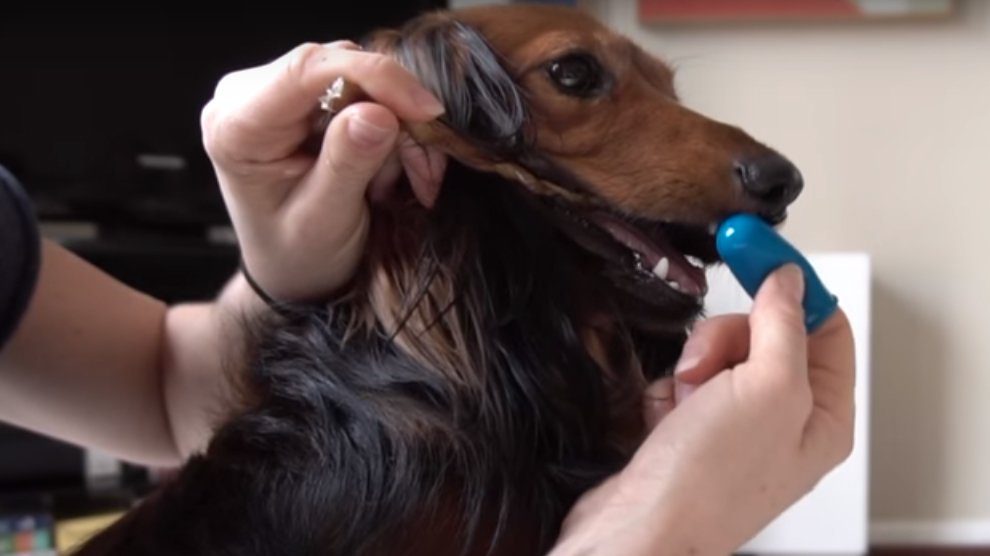Dog Pregnancy Calculator And Timeline
As a dog owner, it’s important to take care of your pet’s dental health to ensure their overall health and well-being. Unfortunately, dental care is often overlooked by many pet owners, which can lead to serious health problems for their furry friends.
Taking care of your dog’s dental health is crucial for its overall health and well-being. In addition to regular dental check-ups with a veterinarian, there are many things you can do at home to help maintain your dog’s dental health.
Here are some dog dental care tips to keep your furry friend’s teeth and gums healthy.
Brush Your Dog's Teeth Regularly

Just like humans, dogs need to have their teeth brushed regularly to prevent the buildup of plaque and tartar.
You can use a toothbrush and dog-friendly toothpaste to brush your dog’s teeth, or you can use a finger brush or dental wipes. It’s important to start slowly and be patient when introducing your dog to tooth brushing.
Gradually increase the amount of time you spend brushing your dog’s teeth until you can brush its entire mouth in one session. Aim to brush your dog’s teeth at least 2-3 times per week.
Provide Dental Chews And Toys

Dental chews and toys can help keep your dog’s teeth clean by reducing plaque and tartar buildup.
Choose chews and toys that are designed to promote dental health, such as those that are made of rubber or have ridges and bumps that help clean teeth.
Avoid chews and toys that are too hard and can break your dog’s teeth. Always supervise your dog when they are chewing on toys or treats.
Feed Your Dog A Healthy Diet
What your dog eats can also affect its dental health. Feeding your dog a healthy diet that is high in protein and low in carbohydrates can help prevent the buildup of plaque and tartar.
Avoid feeding your dog sugary or starchy foods, which can contribute to dental problems. If you’re not sure what to feed your dog, consult with your veterinarian for recommendations.
Provide Plenty Of Fresh Water
Drinking plenty of water can help flush bacteria and food particles out of your dog’s mouth, reducing the risk of dental problems. Make sure your dog always has access to fresh, clean water.
Consider Dental Treatments

There are several dental treatments that can help maintain your dog’s dental health. These include professional dental cleanings, which are typically performed under anesthesia by a veterinarian.
Some veterinarians also offer dental sealants, which can help protect your dog’s teeth from decay.
Watch For Signs Of Dental Problems

Regular dental check-ups with a veterinarian are important for catching dental problems early, but it’s also important to watch for signs of dental problems at home.
Some signs to look for include bad breath, swollen or bleeding gums, loose or missing teeth, and difficulty eating or chewing. If you notice any of these signs, consult with your veterinarian right away.
Start Early
It’s never too early to start taking care of your dog’s dental health. Start brushing your dog’s teeth and providing dental chews and toys as early as possible to help prevent dental problems from developing.
Importance Of Dog Dental Care
The Benefits of Regular Dental Check-Ups Regular dental check-ups are essential for maintaining your dog’s dental health.
During a dental check-up, a veterinarian will examine your dog’s teeth and gums for signs of disease or decay. They may also perform a dental cleaning to remove any tartar or plaque buildup.
Regular dental check-ups have many benefits, including:
- Preventing dental disease: Regular dental check-ups can help catch dental disease early before it becomes a more serious problem.
- Reducing the risk of other health problems: As mentioned earlier, poor dental hygiene can lead to a range of health problems, including heart disease. Regular dental check-ups can help reduce the risk of these health problems.
- Saving money: Treating dental disease early can be less expensive than treating it when it has progressed to a more serious stage.
Why Do Dogs Need Their Teeth Cleaned?

Dental care is just as important for dogs as it is for humans. Poor dental hygiene can lead to a range of health problems, including gum disease, tooth decay, and even heart disease.
In fact, studies have shown that dogs with poor dental health are more likely to develop heart disease than those with healthy teeth and gums.
In addition to the risk of serious health problems, poor dental hygiene can also cause discomfort and pain for your dog. Gum disease, for example, can cause pain and inflammation, making it difficult for your dog to eat and drink.
This can lead to weight loss, malnutrition, and other health problems.


















